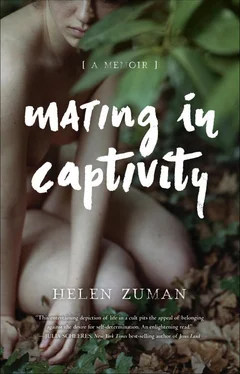Images coalesced and dissolved on its vast, glassy surface. The Harley’s throttle twisting under the driver’s grip. The surprise on the one familiar face I’d found the night before in the Redfish kitchen. The kind eyes of the man who’d treated me to dinner in the Redfish restaurant.
Chad’s appearance hadn’t changed in the four years since I’d last seen him: he wore the same white chef’s coat, the same jaded-yet-sincere smile tinged with sneer. Mine had: I’d traded my baggy black polo shirt and frumpy cotton skirt for a tank that hugged my breasts and pants that hugged my hips. When I told him I’d joined an artists’ commune, he nodded in approval. “I don’t know much about artists’ communes, but that place must be treating you pretty good, ’cause you look great.”
Dinner brought another reversal, another subtle triumph. In my two and a half seasons behind the scenes at Redfish—scrubbing pots, slinging salads, flipping eggs—I’d nursed a string of secret crushes while envying my comrades their late-night hook-ups, their summer flings. Now, here I was, on the flip side of the swinging doors, enjoying a Bow-Thai salad across from a handsome man.
Fargo had picked me up in his white Bronco on the outskirts of Idaho City, a faded mining town. He, too, was bound for Stanley, the village near Redfish that called itself the Gateway to the Sawtooths. A homesteader seeking a master’s in English at Boise State, he moved and spoke with equal grace.
When the conversation in the Bronco turned to Zendik, he enraged me by interrogating each of my sweeping statements. How did I know that Ecolibrium was the future? That lying caused ecocide? That the world would be healed if everyone lived as we did at the Farm? As I reddened, he remained calm. Finally, I dropped the subject, taking my pain as proof that the entire line of inquiry was a lie.
At dinner, I reveled in the soft glow of the pine walls, varnished to a warm gold, while savoring the gentle thrill of attention from a man who was attractive, articulate, respectful (if blind to the beauty of Zendik), and single. This wasn’t exactly a date—Fargo had offered to pay for me only after I’d pled poverty—but it was still the closest I’d come to my pre-Zendik fantasy of a guy taking me out to dinner and a movie. And though I couldn’t muzzle my inner critic, I knew no one would pounce with input the moment we left the dining room. Back at our campsite on the banks of the Salmon, he repaired to his tent, I to my sleeping bag. The night was clear, the river’s rush a gentle roar.
The next morning, with rain forecast later in the day, he urged me to borrow his tent for my trek into the wilderness. He’d sleep in his car by the river; he was just going fishing. I refused. I liked him but wouldn’t thread myself, even by so fine a line, to a man who rejected Zendik. I did give him a magazine, when we parted at the Iron Creek Trailhead, on the off chance that it might reach him.
Gazing deeper into my dimming looking glass, I watched storm clouds mass over the mountains and wondered if I’d been wrong to shun Fargo’s offer. I saw myself hitching a ride to his hidden driveway, knocking on his cabin door. Him grinning in pleased surprise, inviting me in. Me stepping over the threshold, easing my pack to the floor, warming up under a cloak of welcome and wood smoke.
It was too late. I’d refused the tent. I would not knock on Fargo’s door for no reason. What mattered was the quickening I felt spinning this fantasy—and the lethargy that stiffened me when I imagined speeding back to the Farm.
The lake would yield no miracle cure for my break with Zendik. Rather, it seemed to be showing me the contours of an ordeal more arduous than reaching the Sawtooths: playing out—and laying to rest—my Deathculture desire to mate in the wild.
On a blazing afternoon in late July, Eric and I crouched outside an ice cream shop in Davis, California, plucking small crimson fruits from the scorching sidewalk and dropping them into a plastic bag he’d grabbed from the basket of his tandem. Now a PhD candidate in mathematics at UC Davis, Eric had once been my classmate at Harvard. I’d called him from my brother’s apartment in Boise, then hitched across the Sierra Nevada to meet him.
In four years at Davis, Eric had learned how to fruit-hunt. We’d already gleaned grapes, figs, and peaches from the grounds of Village Homes, a local cohousing development, and more peaches from a university orchard. Biking back to his place, we’d spotted a constellation of oozing goo-splats, reddish-purple against the gray cement. The fruits were strange to both of us. Cherries didn’t splat like that, but, for lack of a better name, we called them cherries.
Our bag was filling rapidly. Eric rocked back on his heels and held it up by its handles. Purple juice pooled in one corner.
“What are we gonna do with all these?” He swung the bag. More juice oozed into the pool. “We could make a pie or something.”
“No! It would be a shame to cook them. They’re already so amazing.” The fruit’s dense, licorice-sweet flesh was like nothing I’d ever tasted.
“But we have so many. If we try to eat them all raw, we’ll get sick. Or they’ll rot.”
“Not necessarily. I mean, there’s breakfast, lunch, and dinner.”
Eric shrugged, dimples punctuating his soft smile. He closed the bag and nestled it beside the other fruits in his basket.
I smiled back. I knew I was being eccentric—and I knew he could handle it. Since its start eight years earlier, our relationship—friendship? what was it?—had been a study in eccentricity.
We’d met at an ice cream social in September 1994, during our first week at Harvard. After running through the getting-to-know-you formula—where are you from, where do you live, what do you plan to concentrate in—we alit on a common interest in philosophy. He explained (though I did not absorb) the meanings of the terms “epistemology” and “ontology.” I was impressed by his reserve, his thoughtfulness, his determination to push meaning into each word.
Yet we didn’t speak again till the following spring—when he sent me a letter, via university mail, praising an essay I’d written for the Harvard Salient . In the essay, “Thinking About Talking,” I’d shredded the getting-to-know-you game, claiming, “I’d rather not talk than have a meaningless conversation,” and pled for a fresh round of questions: “Who are you?” “What matters to you?” “Why are you here?” In his letter, Eric echoed my sentiments and declared, “Now I am even more certain that you are who I thought you were.” I didn’t ask who he thought I was—a fellow misanthrope? a deep thinker? his soul mate? I embraced the good news that my writing had reached someone—that I, too, had made an impression.
In response, I knocked on the door of his dorm room shortly before midnight and asked if he wished to go walking. He said yes, and we ended up trekking twenty-six miles, round-trip, to the suburb of Bedford. We barely spoke—maybe the impossibly high bar we’d set in writing had left us too self-conscious to start a conversation—but for more than six hours I tuned to his movements, hearkened to his breath, matched the quick rhythm of his steps. By the time we parted, at 6:00 a.m., we’d shared silence and a sunrise and spun an unlikely story.
After that we took more walks, and ate together on occasion. Always, we sank into long spells of silence fraught with risks we didn’t take—like touching, like asking who we were to each other. We remained ellipses, locked in prolonged elision.
My first night in Davis, we walked out to a cowpen attached to the university agricultural station. At Eric’s urging, I climbed with him over the fence. “Stand still and let them come to you. I promise you won’t get hurt.” One cow approached, then another. Each sniffed me with its wide nostrils, bathed me in its moist breath.
Читать дальше











